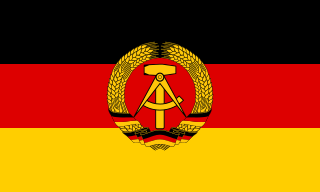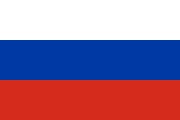
The United States men's national ice hockey team is based in Colorado Springs, Colorado, with its U18 and U17 development program in Plymouth, Michigan. The team is controlled by USA Hockey, the governing body for organized ice hockey in the United States. The U.S. team is currently ranked 4th in the IIHF World Rankings.

The Soviet Union (USSR) competed, for the last time before its dissolution, at the 1988 Summer Olympics in Seoul. 481 competitors, 319 men and 162 women, took part in 221 events in 27 sports. Athletes from 12 of the ex-Soviet republics would compete as the Unified Team at the 1992 Summer Olympics, and each nation would field independent teams in subsequent Games.

Athletes from East Germany competed at the 1980 Summer Olympics in Moscow, USSR. 346 competitors, 222 men and 124 women, took part in 167 events in 17 sports.

The Russia women's national volleyball team is governed by the Russian Volleyball Federation and participated in international volleyball competitions. They played from 1949 to 1991 as the Soviet Union and as the CIS in 1992.

The Australian national water polo team represents Australia in men's international water polo competitions and is controlled by Water Polo Australia. The national men's team has the nickname of "The Sharks". It is organised into the Asia/Oceania regional group.

The Russia women's national water polo team represents Russia in international women's water polo competitions and friendly matches.

The Netherlands national water polo team represents the Netherlands in men's international water polo competitions and friendly matches. The team won bronze medals at the 1948 Summer Olympics and the 1976 Summer Olympics.

The Brazil men's national water polo team represents Brazil in international men's water polo competitions and friendly matches.

The Mexico men's national water polo team represents Mexico in international men's water polo competitions and friendly matches.

The Canada men's national water polo team represents Canada in international men's water polo competitions and friendly matches. The team is overseen by Water Polo Canada, a member of the Fédération Internationale de Natation (FINA). The team qualified for the 2008 Summer Olympics in Beijing, PR China by finishing fourth at 2008 Olympic Qualifying Tournament in Romania.

The China women's national water polo team represents China in international women's water polo competitions and friendly matches. It is one of the leading teams in Asia.

The China men's national water polo team represents China in international water polo competitions and friendly matches. It is one of the leading teams in Asia.

The Germany national water polo team represents Germany in international men's water polo competitions and friendly matches. It is controlled by German Swimming Federation.

The Italy national water polo team represents Italy in men's international water polo competitions and is controlled by Federnuoto. The national men's team has the nickname of "Settebello", a reference to both the Italian card game scopa and a standard water polo team having seven players.

The Soviet Union men's national water polo team represented the Soviet Union in international water polo competitions. After the dissolution of the Soviet Union, the Russian national water polo team became the successor of the Soviet team.

The Romania men's national water polo team is the representative for Romania in international men's water polo.

The France men's national water polo team is the representative for France in international men's water polo.

The Japan men's national water polo team is the representative for Japan in international men's water polo.

The Germany women's national water polo team represents Germany in international women's water polo competitions and friendly matches.
The Water Polo Federation of Ukraine is an all-Ukrainian public organization whose goal is to develop water polo in Ukraine. The Federation organizes official water polo competitions and is an affiliated member of FINA and LEN – the International Swimming Federation and the European Swimming Federation. It cooperates with the National Olympic Committee, as well as other Ukrainian and international sports organizations. The activities of the Federation is guided by the Charter, the new version of which was approved on March 13, 2020.
















